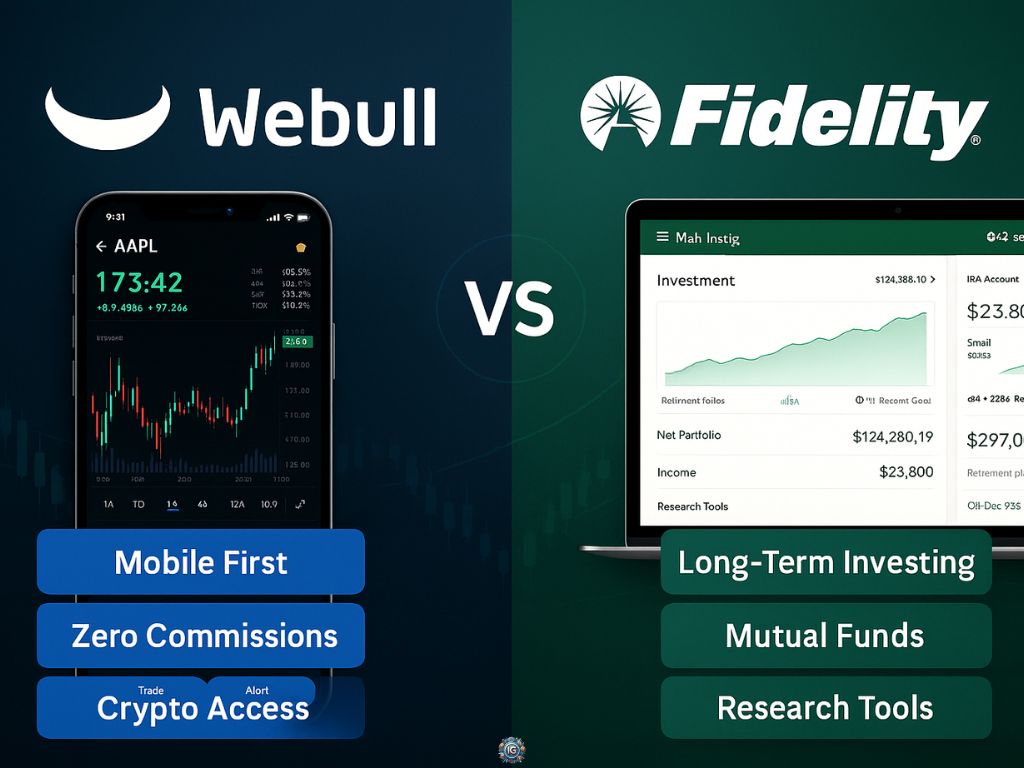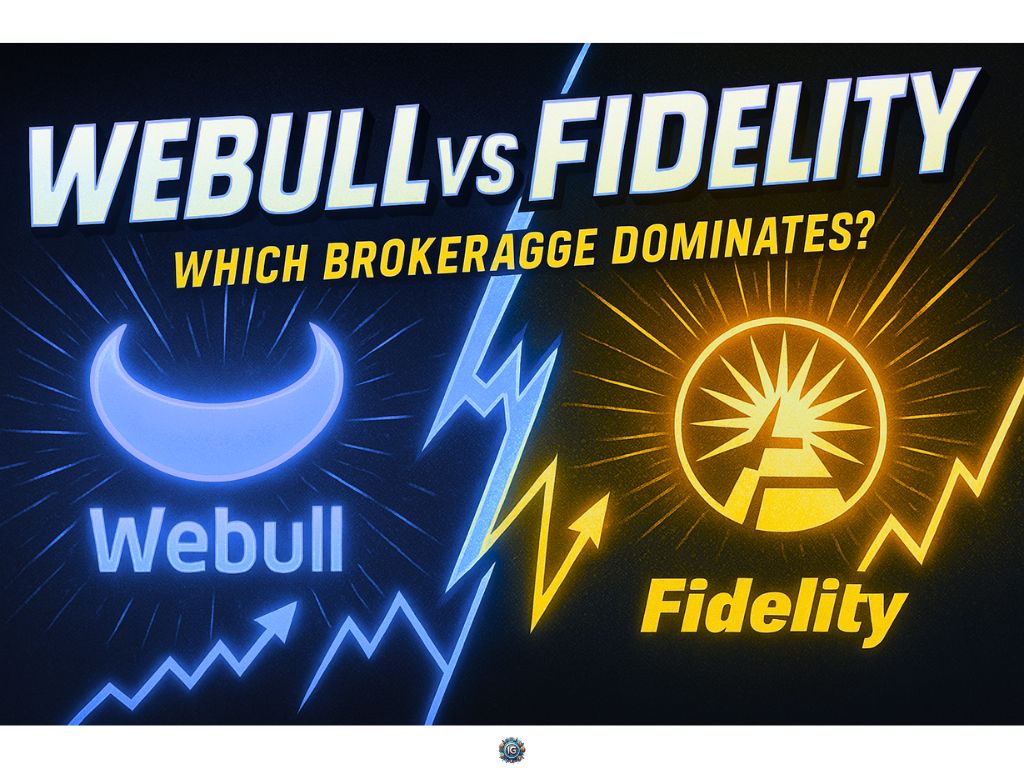Introduction
Webull and Fidelity represent two completely different approaches to investing — and your choice between them says everything about how you want to build wealth.
Webull is mobile-first, sleek, and engineered for traders who want speed, access, and simplicity — without the overhead of legacy platforms.
Fidelity is time-tested, data-rich, and deeply trusted by long-term investors, retirement planners, and serious wealth builders.
They both offer zero-commission trading, but they don’t serve the same type of investor.
This guide cuts through the noise to show you how they compare on fees, tools, assets, support, and account flexibility — so you can decide which platform is right for your strategy, your style, and your future.
Key Takeaways
- Webull is built for active traders who want real-time charts, crypto access, and a clean mobile-first experience.
- Fidelity is a full-service brokerage designed for long-term investors, offering retirement accounts, mutual funds, and robust financial planning tools.
- Both platforms offer commission-free trading on U.S. stocks and ETFs, but differ significantly in available assets and account types.
- Fidelity supports IRAs, 401(k) rollovers, mutual funds, bonds, and CDs — Webull does not.
- Webull offers crypto trading and paper trading, features not currently available on Fidelity.
- Choose Webull if you value speed, simplicity, and want to trade crypto.
- Choose Fidelity if you need retirement planning, access to funds and bonds, or want personalized service.

Platform Overview: Webull vs Fidelity
Webull: A Modern Trading App for Active Investors
Launched in 2017, Webull is a technology-driven platform designed for retail traders who want a fast, mobile-first experience. It offers commission-free trading, real-time market data, options, and crypto — all wrapped in a sleek, intuitive interface.
It doesn’t try to be a full-service broker. Instead, it strips things down to what active traders need: clean execution, sharp charts, and low friction.
Best for: self-directed traders, younger investors, and users who prefer real-time control over long-term planning.
Fidelity: A Trusted Legacy Brokerage for Long-Term Investors
Fidelity is one of the most established financial institutions in the world — with a reputation for reliability, retirement services, and research-driven investing. With more than $10 trillion in assets under administration, it’s built for investors who want access to everything: mutual funds, IRAs, bonds, advisor support, and low-cost index investing.
Fidelity combines traditional investing infrastructure with modern tools and zero-commission pricing.
Best for: long-term investors, retirement planners, and anyone who wants access to a complete financial ecosystem.
In short:
- Webull is lean, fast, and focused on trading.
- Fidelity is broad, stable, and focused on wealth-building.
Webull vs Fidelity: Fees and Pricing
Both Webull and Fidelity offer commission-free trading on U.S. stocks and ETFs, but the similarities stop there. Their fee structures diverge based on what you’re trading, how often, and what type of investor you are.
Here’s how the two platforms compare across core fee categories:
Stock & ETF Trading
- Webull: $0 commission on all U.S. stocks and ETFs
- Fidelity: $0 commission on U.S. stocks and ETFs
Verdict: Tie
Options Trading
- Webull: $0 commission + $0.55 per contract
- Fidelity: $0 commission + $0.65 per contract
Verdict: Webull is slightly cheaper for options traders.
Crypto Trading
- Webull: Supports direct crypto trading with a 1% spread on buy/sell transactions
- Fidelity: Does not currently support direct crypto trading (only Bitcoin via Fidelity Crypto in limited rollout)
Verdict: Webull wins for crypto access
Mutual Funds
- Webull: Does not support mutual funds
- Fidelity: Offers over 3,500 no-transaction-fee mutual funds and access to thousands more
Verdict: Fidelity is the only choice for mutual fund investors
Margin Rates (as of 2025)
- Webull: Starts at 9.74% APR
- Fidelity: Starts at 12.325% APR for balances under $25,000, with tiered discounts for higher balances
Verdict: Webull is more cost-effective for small-balance margin users; Fidelity becomes competitive at larger balances
Inactivity & Maintenance Fees
- Webull: No inactivity fees
- Fidelity: No account minimums or inactivity fees for retail accounts
Verdict: Tie
Final Summary
| Fee Category | Winner | Why It Matters |
| Stock & ETF Trading | Tie | Both are $0 commission |
| Options | Webull | Lower per-contract fee |
| Crypto | Webull | Fidelity doesn’t support direct trading |
| Mutual Funds | Fidelity | Webull doesn’t offer them |
| Margin | Webull (small balances) | Lower entry-level rate |
| Inactivity Fees | Tie | No penalties on either platform |
If you’re trading crypto or options frequently, Webull saves you more over time. If you’re focused on fund-based investing or retirement, Fidelity delivers more depth and access.
Webull vs Fidelity: Account Types and Investment Products
This is where the gap between Webull and Fidelity becomes hard to ignore. While Webull focuses on a streamlined set of trading accounts, Fidelity offers a full suite of investment vehicles, including retirement accounts, cash management, and long-term wealth tools.
Account Types
| Account Type | Webull | Fidelity |
| Individual Brokerage | ✅ Yes | ✅ Yes |
| Joint Accounts | ❌ No | ✅ Yes |
| Roth IRA / Traditional IRA | ✅ Yes (limited features) | ✅ Yes (robust support + tools) |
| Custodial Accounts | ❌ No | ✅ Yes (UGMA/UTMA) |
| 401(k) Rollovers | ❌ No | ✅ Yes |
| Cash Management | ❌ No | ✅ Yes (Fidelity Cash Management Account) |
Verdict: Fidelity wins decisively for retirement, family, and multi-account investors.
Investment Products
| Product Type | Webull | Fidelity |
| U.S. Stocks & ETFs | ✅ Yes | ✅ Yes |
| Options | ✅ Yes | ✅ Yes |
| Crypto | ✅ Yes (direct trading) | ⚠️ Limited (Bitcoin only, early access) |
| Mutual Funds | ❌ No | ✅ Yes (thousands available) |
| Bonds & CDs | ❌ No | ✅ Yes |
| International Stocks | ❌ No | ✅ Yes (limited access) |
| IPO Access | ✅ Yes (select listings) | ✅ Yes (via new issue center) |
Verdict:
- Webull is built for traders who want real-time access to stocks, options, and crypto.
- Fidelity supports long-term investors with access to mutual funds, bonds, IRAs, and planning tools most app-based brokers skip.
If you’re only trading stocks or crypto, Webull is more than enough. If you’re building a long-term portfolio or managing multiple goals, Fidelity is far more comprehensive.
Tools and Features: Webull vs Fidelity:
Webull: Built for Traders Who Want Speed and Simplicity
Webull is designed for active traders who value real-time data and fast execution. While it skips some of the deeper planning tools, it makes up for it with responsive performance and trading-focused features.
Notable Features:
- Advanced charts with over 50 indicators
- Level 2 market data (via subscription)
- Real-time news feed and watchlist alerts
- Paper trading with virtual portfolios
- Extended hours trading (pre-market and after-hours)
- In-app crypto trading
- IPO access for select listings
What’s Missing:
- No long-term goal planning tools
- No in-depth research reports or retirement calculators
- Limited educational content
Fidelity: Built for Investors Who Think Decades Ahead
Fidelity offers a complete research and planning ecosystem. While it may not be as lightweight or snappy as Webull, it provides everything needed for long-term financial decisions — with the data and support to back them up.
Notable Features:
- Detailed research from Morningstar, Zacks, and CFRA
- Retirement calculators and wealth planning tools
- Custom portfolio analysis and comparison tools
- Screeners for stocks, funds, bonds, and ETFs
- ESG filters and socially responsible investing insights
- Robust education library (videos, webinars, courses)
- Integration with Fidelity-managed accounts and advisors
What’s Missing:
- No paper trading
- No direct crypto trading (limited Bitcoin pilot access)
- Slower, more complex interface for new investors
Final Verdict
- Choose Webull if you’re focused on trading speed, charts, and crypto access.
- Choose Fidelity if you want deep research, planning tools, and long-term investment support.

User Experience: Webull vs Fidelity
Webull: Fast, Minimal, and Made for Mobile
Webull delivers a slick, high-performance interface that feels native to mobile-first traders. Whether you’re charting, placing trades, or watching price alerts, the platform is built for speed and clarity.
Pros:
- Highly rated mobile app (iOS and Android)
- Intuitive layouts with real-time market data
- Quick order entry and smooth navigation
- Fast onboarding with minimal friction
Cons:
- Limited customization on the desktop platform
- No direct customer support phone line — support is email or in-app chat only
- New investors may find the layout overwhelming at first
Webull is ideal for those who value speed and independence over traditional hand-holding.
Fidelity: Reliable, Customizable, and Full of Depth
Fidelity’s interface isn’t flashy — but it’s powerful. While it may feel slower or more complex to beginners, the platform offers a full-service dashboard experience, especially on desktop.
Pros:
- Rich account dashboard with deep customization
- Integrated goal planning and research
- Strong desktop tools for long-term investors
- Full customer service: phone, chat, in-person support
Cons:
- Mobile app is functional but lacks modern design polish
- More menus, more options — which means a longer learning curve
- Less trading-focused; better suited for building portfolios over time
Fidelity is built for investors who want depth, reliability, and access to full-service support.
Verdict
- Webull shines for mobile traders who want fast access and clean execution
- Fidelity is better for those who want a full-featured platform and human support to guide complex decisions
Webull vs Fidelity: Who Each Platform Is Best For
Choose Webull If…
- You’re an active trader who relies on charts, price alerts, and speed
- You want to trade stocks, options, and crypto in a single mobile app
- You’re focused on short-term moves rather than long-term planning
- You prefer a minimalist platform without unnecessary financial products
- You don’t need IRAs, mutual funds, or bonds
Webull is for self-directed, modern investors who want trading tools without the friction of traditional platforms.
Choose Fidelity If…
- You’re investing for retirement, long-term goals, or family wealth
- You want access to mutual funds, bonds, and full retirement accounts
- You value robust customer support, financial planning tools, and research
- You’re building a diversified portfolio and want help doing it
- You’re not concerned with crypto or app-based design polish
Fidelity is ideal for long-term investors who want full control, institutional trust, and room to grow.

FAQs About Webull and Fidelity
Can I use both Webull and Fidelity?
Yes. Many investors open accounts with both platforms — using Webull for short-term trading and crypto, and Fidelity for retirement accounts, mutual funds, or wealth planning. There’s no conflict or penalty for using both.
Does Fidelity offer crypto trading?
Fidelity has launched limited Bitcoin trading through its Fidelity Crypto platform, but access is still restricted and only supports Bitcoin and Ethereum. It does not offer direct crypto trading in the same way Webull does.
Can I trade mutual funds on Webull?
No. Webull does not support mutual funds, retirement accounts, or bonds. It is focused on self-directed trading of stocks, ETFs, options, and crypto.
Is Webull good for beginners?
Webull can be beginner-friendly once you learn the interface, but it’s designed more for active traders. Newer investors may find Fidelity easier for long-term strategy, research, and planning support.
Does Fidelity offer paper trading?
No. Fidelity does not offer a paper trading environment. If you’re looking to simulate trades before risking real capital, Webull offers built-in paper trading with real-time data.
Which platform is better for retirement planning?
Fidelity — without question. It supports Roth IRAs, Traditional IRAs, 401(k) rollovers, custodial accounts, and offers comprehensive retirement calculators, financial advisors, and fund access.

Conclusion: Webull vs Fidelity — Final Verdict
Webull and Fidelity serve two very different types of investors.
Webull is fast, sleek, and optimized for traders who want to move quickly — in and out of stocks, options, or crypto — all from a mobile-first platform. It’s best if you value simplicity, real-time control, and modern tools without the legacy baggage.
Fidelity, on the other hand, is a complete financial ecosystem. If you’re investing for retirement, building long-term wealth, or managing family assets, Fidelity gives you everything — from mutual funds to IRAs to professional support.
Here’s the bottom line:
- Choose Webull if you want to trade actively, dabble in crypto, and operate with speed.
- Choose Fidelity if you’re investing for the future, want access to planning tools, and need account types Webull doesn’t offer.
Still undecided? You don’t have to be. Try both — and see which one feels right once you start moving your money.
For a fintech-focused matchup, check out Moomoo vs Webull.
Discover How Your Phone Could Be Paying You Daily!
Done-For-You ISH...

1 thought on “Webull vs Fidelity: Which Broker Wins for Modern Investors?”